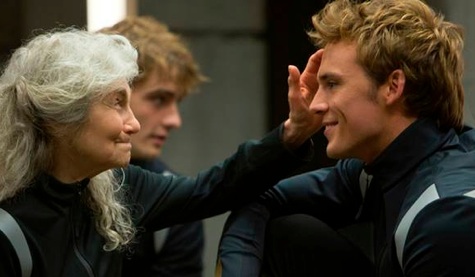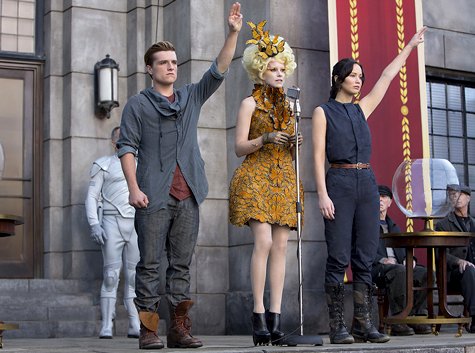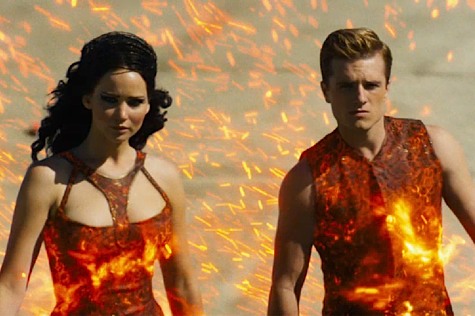If you ever wanted to leave a movie theater gasping for breath, certain that you would never again feel happiness, I recommend that you do what I did and go for a Hunger Games/Catching Fire double feature. (They did it for opening night, and I wanted the first film fresh in my mind. Hoo boy.)
You mean you’d prefer not to be destroyed? Okay, you should probably just see Catching Fire on its own. You’ll might still have a hard time breathing by the end, though.
Mild spoilers below for Catching Fire.
While The Hunger Games made quite the impression on theater-goers last year, it was called out on its cheap budget and certain artistic choices that didn’t strike the right chord. For those who were plagued by the realism of their hayride-style shaky cam, you will be glad to know that Catching Fire dispensed with the effect altogether, making the second film a much smoother ride. In addition, the budget was given a healthy lift, resulting in a Capitol that shows it’s scope and better special effects. The crowds finally look real and not just twenty people deep this time around. The backgrounds have more layering to them. Everything is appropriately shiny and awful at the same time.
The supporting cast add even more shine to the sequel, from old hats like Woody Harrelson’s comfortably drunk Haymitch to newcomers such as Jeffery Wright’s bespectacled savant Beetee. Jenna Malone is clearly having a blast as Johanna Mason, cursing and axing things and telling people off—it’s a perfectly suited role that almost plays like it was written with her in mind. While Sam Claflin may have been a bit too doe-eyed during his turn in Pirates of the Caribbean: On Stranger Tides, he proves his charm ten times over as Finnick Odair, a fan favorite from District 4 who everyone seemed to be holding their breath about since before the first film had been cast.

These side characters are particularly important because Catching Fire as a film has certain abilities that Suzanne Collins’ book does not by again getting out of Katniss’ first person narration. The audience is allowed to really bask in Effie Trinket’s personal discomfort the closer she feels to her victors. We spend a great deal more time with Plutarch Heavensbee, the new game maker; Phillip Seymour Hoffman knows exactly how to hold an audience to attention, to make certain that they don’t dismiss him the way they might have done to his predecessor, Seneca Crane.
The biggest problem with Catching Fire is that everything is ultimately a grand setup for the two films they have planned for Mockingjay. If you are not familiar with the books, if you are uncertain about where the movie needs to go to achieve this goal, the pacing will undoubtedly seem off especially toward the end. It has far too many denouements for your average action-heavy film, but every one of them is important in laying ground for what’s to come. Every essential emotional note of Collins’ story is also included, so be prepared to feel one gut punch after another. This is not a fun film, and it’s also not big on laughs. The first half of the film in particular is immediate and painful, and very good at reminding the audience of the price of Katniss’ victory.
Jennifer Lawrence naturally commands the screen, moreso now that she clearly feels comfortable in the role. Her post traumatic stress is tackled head on, as well as her conflicted feelings for the few people she holds dear. There is romance here, yes, but none of it is tinged with hope or promises of safety and healing. Katniss personal sense of irony comes through all too well on this outing, and its amazing watching her try to fake emotions that she’s not feeling.

The film makes less of a point of sticking to the book scene by scene, and it feels freer than the previous film for it, though the latter half perhaps gets a bit lost in translation. It makes little difference—if you are invested in the characters (which it is very hard not to be), you’re on the wagon and you’re not getting off. The movie ends on a solidifying moment and is driven home artfully in the final frames. There’s a revolution coming and you know exactly whose side you want to be on when it arrives.
Head out and enjoy this one. And by enjoy, I mean “remember that it’s not my fault you decided to inflict all this pain on yourself.” You have been warned.
Emmet Asher-Perrin should probably just start self-medicating like Haymitch at this point. You can bug her on Twitter and read more of her work here and elsewhere.










